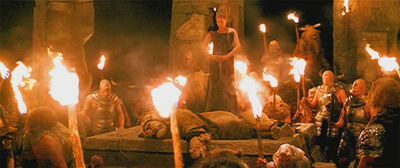
Aslan's willing sacrifice to the White Witch.
The deeper magic was a hidden law written on the Stone Table before the Dawn of Time.
It effectively acted as an addendum to the Deep Magic from the Dawn of Time; if an innocent being willing offered his own life in place of a traitor's, the deeper magic would reverse death itself and restore them to life.
History[]
Immediately after the sacrifice of Aslan, the White Witch Jadis's forces leave to prepare for battle, leaving his dead body on the Stone Table. Susan Pevensie and Lucy Pevensie came out from their hiding spot and wept over him.
Greatly saddened, the girls managed to remove the muzzle from his face but were unable to untie the cords around him. They then spent the rest of the night in a miserable daze, and cried until they could cry no longer, until eventually they returned to his body, and saw mice (ancestors to Reepicheep and Peepiceek) scampering over him. Susan had raised a hand to scare them away, but Lucy noticed that they were actually nibbling at the cords, trying to untie him.
The mice left as dawn arrived, and Susan and Lucy walked around aimlessly, as the first rays of sunrise broke the sky. They were looking at Cair Paravel when, at that moment, they heard a deafening crack. When they turned around, they saw that the Stone Table had been broken in half, and Aslan had disappeared.
Lucy asked if this was more magic, and a voice behind her answered her, telling her that it was, indeed, more magic.
When they turned around again, they saw Aslan, alive and well. They rushed to him, with Susan asking him if he was a ghost. He alleviated their fears, though, with his warm breath. To answer their question, he explained that the Witch was right, that the Deep Magic had decreed that all traitors' lives are forfeited to her, but if she had looked back before the dawn of time, she would have read a different incantation: -
- "It means that though the Witch knew the Deep Magic, there is a magic deeper still which she did not know. Her knowledge goes back only to the dawn of time. But if she could have looked a little further back, into the stillness and the darkness before Time dawned, she would have read there a different incantation. She would have known that when a willing victim who had committed no treachery was killed in a traitor's stead, the Table would crack and Death itself would start working backwards."
- ―Aslan describing the deeper magic (Chapter 15).[src]
Elated by this revelation, Aslan then led the girls on a wild chase through Narnia.
Comments[]
Aslan's resurrection clearly parallels the resurrection of Christ. Moreover, the Stone Table on which he is sacrificed (inscribed with the Emperor-beyond-the-Sea's Deep Magic) evokes the stone tablets that Moses brought down from Mount Sinai — and Lewis acknowledged that he had Moses's tablets in mind when he described the Stone Table.
The strange symbols and runes carved into this unimaginably ancient artifact seem to be relics of Old Narnians religion, the religion the Witch invokes when she calls upon the Deep Magic.
Indeed, the Witch says that the Deep Magic is carved into the Stone Table itself.
When the Stone Table breaks, the event signifies the end of an era. Narnia undergoes a transition from an old, unforgiving faith to a new, vibrant and compassionate one.
The same thing can be said to have happened when Christ rose from the dead: God's old covenant with man was replaced with a new covenant. Aslan's suffering and death both renew and transform the Deep Magic that governs the universe of Narnia.
Trivia[]
- C. S. Lewis does not describe the fate of the mice that gnaw away at Aslan's cords, but he writes it in future books. Most of the animals in Narnia speak English. The mice, however, had never spoken. In all of the books following The Lion, the Witch, and the Wardrobe, mice have the gift of speech. Aslan explains that the mice can speak because of the kindness that they showed when they freed him. Aslan, like God, will reward all good deeds, even deeds by the poorest and lowliest creatures. The mice are exalted through this act of kindness and transfigured by their generosity and goodwill.
- Reepicheep and Peepiceek are descendants of those mice.
